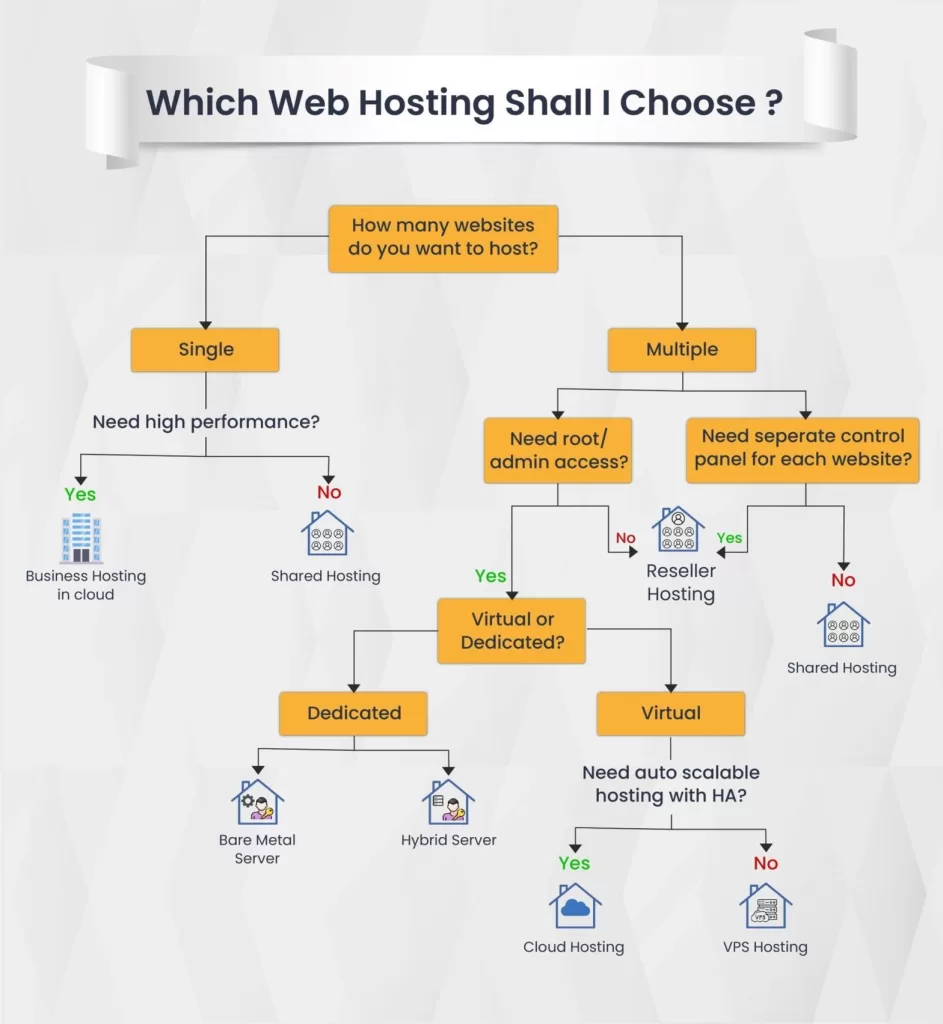Choosing the right web hosting company is one of the most important decisions you’ll make when launching a website. Whether you’re a small business owner, a blogger, or an eCommerce entrepreneur, the hosting service you select will influence your site’s performance, security, and scalability. With so many options available, how do you make the best choice? This guide will walk you through the key factors to consider when choosing the right web hosting provider for your needs.
Understand the Types of Web Hosting
Web hosting comes in various forms, and understanding the differences is crucial to making an informed decision:
Shared Hosting
Shared hosting is where multiple websites share a single server. It’s the most affordable option, making it ideal for beginners or small websites with low traffic. However, performance may suffer if one of the sites on the server experiences high traffic or technical issues.
VPS Hosting (Virtual Private Server)
VPS hosting offers more resources than shared hosting, as it divides a physical server into several virtual servers. Each website gets its own dedicated portion of the server’s resources, providing better performance and more control. This option is suitable for medium-sized businesses or websites experiencing moderate traffic.
Dedicated Hosting
With dedicated hosting, you lease an entire physical server for your website. This means greater control, high performance, and enhanced security. Dedicated hosting is ideal for high-traffic websites or businesses requiring maximum control over server configurations.
Cloud Hosting
Cloud hosting uses a network of virtual servers to host websites, offering scalability and reliability. Your site can tap into multiple servers as needed, making it a good choice for growing businesses or websites that experience fluctuating traffic levels.
Managed Hosting
In managed hosting, the provider takes care of server management tasks, such as software updates, security patches, and backups. This is a great option for businesses that don’t have the technical expertise to manage a server themselves.
This image is originally from an article from WebSpaceKit.
Assess Your Website’s Needs Before Choosing a Web Hosting Plan & Provider
Before you begin comparing hosting providers, you need to have a clear understanding of what your website requires:
Traffic Volume: Estimate your website’s expected traffic. A new blog with 100 visitors a month will have different hosting needs than an eCommerce store expecting thousands of visitors daily.
Technical Expertise: Are you comfortable managing server-side issues, or would you prefer a hosting provider that handles technical aspects for you?
Type of Website: Are you running a blog, an online store, or a corporate website? Some hosting services offer optimized plans for specific types of websites, such as WooCommerce hosting for online stores.
Growth Potential: Will your website grow significantly in the near future? If yes, opt for a provider that offers scalable solutions such as VPS or cloud hosting.
Key Features to Look For in Web Hosting
When comparing web hosting companies, there are several important features you should consider:
Uptime Guarantee
Uptime refers to the percentage of time that your website will be up and running. Look for hosting providers that offer at least a 99.9% uptime guarantee. Downtime can result in lost revenue and damage your site’s reputation.
Speed and Performance
A slow website can negatively affect user experience and SEO rankings. Look for a hosting provider that offers fast loading times, ideally with servers located close to your target audience or through Content Delivery Networks (CDNs) that distribute your website’s content across multiple servers globally.
Security
Security should be a top priority, especially if your website handles sensitive information. Look for features such as:
– SSL certificates (many hosts offer this for free)
– Regular backups
– DDoS protection
– Firewalls and malware scans
Customer Support
Customer support is vital when issues arise. Look for a hosting provider that offers 24/7 support through multiple channels (chat, email, and phone). Ensure their support team has a reputation for fast, reliable assistance.
Scalability
As your website grows, your hosting needs will change. Choose a provider that offers easy upgrades to higher-tier plans (e.g., from shared hosting to VPS or cloud hosting) without causing significant disruption to your website.
Control Panel
Most web hosting services come with a control panel like cPanel or Plesk. A good control panel makes it easy to manage your hosting environment, install apps, and perform essential tasks such as backups and email setup.
Pricing and Value for Money
While it’s tempting to go for the cheapest option, cost should not be the sole factor in your decision. Consider the following:
Introductory vs. Renewal Prices: Many hosting providers offer low introductory prices but significantly increase the price upon renewal. Make sure to review both the initial and long-term costs.
Free Features: Look for hosting providers that offer additional features like free domain registration, SSL certificates, or daily backups as part of their hosting packages.
Refund Policy: A good hosting company should offer a money-back guarantee within the first 30 or 60 days, giving you time to evaluate their service risk-free.
Reputation and Reviews
Do thorough research on the hosting company’s reputation. Read customer reviews on platforms like Trustpilot, Google Reviews, and social media. Pay attention to recurring issues such as downtime, customer service quality, and hidden fees. You can also ask for recommendations from peers or online communities to get insights into reliable providers.
Specialized Web Hosting for Specific Needs
If your website has particular needs, consider opting for a provider with specialized hosting services:
eCommerce Hosting: If you plan to sell products online, look for hosting providers that offer specific eCommerce solutions, such as compatibility with shopping carts (WooCommerce, Magento) and secure payment gateways.
WordPress Hosting: For WordPress users, many hosting companies offer optimized hosting plans with one-click WordPress installations, automatic updates, and performance enhancements.
Developer-Friendly Hosting: If you’re a developer or your site requires custom configurations, look for providers that offer root access, SSH access, and support for multiple programming languages.
Green Hosting Options
For environmentally conscious users, green hosting providers use renewable energy sources or offset their carbon footprint. If sustainability is important to you, research hosting companies that are eco-friendly or part of green initiatives.
Trial Periods and Guarantees
Many reputable hosting companies offer trial periods or money-back guarantees. This gives you the opportunity to test their service and performance without committing long-term. Ensure the refund policy is clear and that you understand what it covers.
Conclusion
Choosing the right web hosting company is about finding a balance between your website’s specific needs, your budget, and the features offered by the provider. By considering the type of hosting, the provider’s reputation, performance, scalability, security, and support, you’ll be well-equipped to make the best decision for your website.
A strong hosting provider can make all the difference in your site’s success, so take your time, do your research, and pick the one that fits your needs now and in the future.
If you still can’t decide or are still unsure, contact us today! We can assist you in both picking the right hosting company and getting the website of your dreams made!



